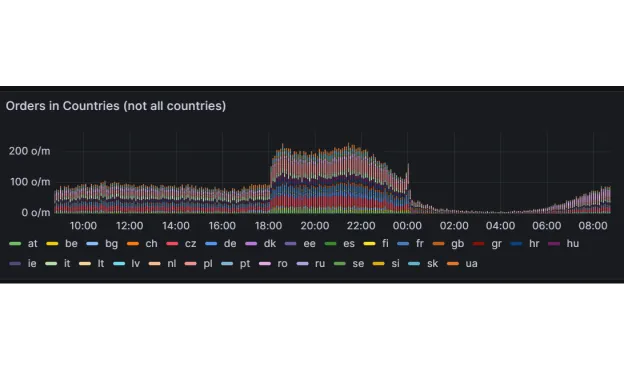Christmas. Our most top season. All departments try to prepare for it as best as possible and ideally in advance. How does this preparation work in IT, specifically in the web and mobile teams? When does it start and how does it happen that we unknowingly get help from "outside" sometimes? Roman Mazálek, WEB Group Team Leader, contributed to our newsletter about all this.
Preparation for the new season for web and mobile teams starts in January, which may sound surprising, but there's a reason for it. The main goal is to evaluate the last season. What went well and what didn't. The success is clear: if the website and apps are running smoothly, we're on the right track. Everything else? An opportunity to learn from mistakes. Then follows a period where we analyze, prioritize and negotiate with other departments and people and prepare a plan for the whole year in terms of implementations.
Usually around the middle of the year, we try to start working with our QA team on stress tests, which are the first measure of whether our services can withstand the planned traffic. We usually calculate this by taking the data from the last season and increasing it by about 100% so that we have a sufficient performance margin. At some points we are even a little "lucky" to have outside help with these tests. Internally we call it DDOS and it usually comes at the least opportune time. Typically while a campaign is running, during some major modification to the site, or at night, which is especially popular. Fortunately, these situations don't happen that often and the attack is detected relatively quickly.
On the other hand, there are many external activities that paradoxically help us. One example - a couple of weeks ago we found out that someone was searching our website every night and downloading information about products and prices. This is positive in that usually such activity generates a relatively good amount of traffic. So it's kind of a free performance test, and we have more data to see how prepared we actually are for the fact that, for example, when we run a campaign, the number of people on the site will grow quickly.
Another big milestone is the beginning of summer when we start prioritizing with the product department the changes we need to deliver before the season starts. Admittedly, it can feel weird when we're in the middle of summer figuring out with the product department what all we want to have on the site and app in November. But it's extremely important for us to avoid last-minute adjustments. Of course, we can't do it 100% of the time, but we've already benefited from it this year, where last-minute requests are down significantly from last year.
Ironically, once everything gets started, it is probably the most stressful time. Those who have experienced at least one season in Notino will probably agree that this period is really challenging. However, this has also made us focus on one thing that has been quite neglected, and that is processes - this not-so-popular part gave us a lot of trouble last year. This was because last year a lot of things were handled in corridors, kitchens and at best emails. Let's face it, if someone is dealing with an incident, is under relatively high pressure and gets the same query from multiple parties, one via email, then via Teams and then somewhere in the kitchen when they go to get water, it doesn't exactly add to the mood. For this reason, this year we have worked on incident management, communication, and most importantly sharing up-to-date information so that no one tends to ask questions "on their own". Personally, I think we've succeeded, although there are obviously things that can be improved.
The preparation of the website and mobile app is not only a matter of our teams, but also the efforts of many other departments, which allow the website and the app as such to run smoothly, to be protected from attacks (after all, we don't have to have unsolicited stress tests every day 😉 ), but also to be procedurally ready and to manage the season with less stress.
I would like to thank not only my colleagues from the web and mobile teams, but also others from IT and other departments, without whom it would definitely not be possible to achieve such results not only during the season. Because we are #WinningAsATeam.
Explanation of the term:
DDOS - distributed denial-of-service attack - high server load (up to thousands of computers at one time)




